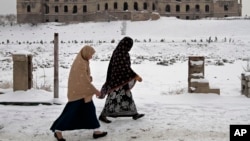KABUL —
Violent crime against women in Afghanistan hit record levels and became increasingly brutal in2013, the head of its human rights commission said on Saturday, a sign that hard won rights are being rolled back as foreign troops prepare to withdraw.
Restoring fundamental women's rights after the Taliban were ousted by a U.S.-led coalition of troops in 2001 was cited as one of the main objectives of the war.
Under the Taliban, women were forced to wear the head-to-toe covering burqa and barred from leaving their homes without being escorted by a male relative. Schools for girls were shut down.
Sima Samar, chair of the Afghanistan Independent Human Rights Commission (AIHRC), told Reuters in a telephone interview that the brutality of attacks on women had greatly intensified.
"The brutality of the cases is really bad. Cutting the nose, lips and ears. Committing public rape," she said. "Mass rape...It's against dignity, against humanity."She attributed the increase in crime to a culture of impunity and the imminent departure of international troops and aid workers, leaving women more exposed to attack.
In addition, more cases were reported as women became aware of their rights “The presence of the international community and provincial reconstruction teams in most of the provinces was giving people confidence," Samar said."There were people there trying to protect women. And that is not there anymore, unfortunately."Most foreign forces are due to leave Afghanistan by the end of the year and it is unclear whether any will remain beyond 2014 as relations deteriorate between Afghan authorities and their U.S. backers.
An AIHRC spokesman said the latest figures for 2013 showed a 25 percent increase in cases for March through September. Samar said a deteriorating economy and growing insecurity had also contributed to the rise in reported incidents.
A leading advocate of women's rights said improving the situation would be difficult as laws with provision to protect them were notoriously difficult to implement.
"Killing women in Afghanistan is an easy thing. There's no punishment," Suraya Pakzad, who runs women's shelters in several provinces, told Reuters in her office in the western city of Herat.
She cited recent cases in which women been publicly stoned as Afghan troops looked on."Laws are improved, but implementation of those laws are in the hand of warlords... I think we are going backwards."
Restoring fundamental women's rights after the Taliban were ousted by a U.S.-led coalition of troops in 2001 was cited as one of the main objectives of the war.
Under the Taliban, women were forced to wear the head-to-toe covering burqa and barred from leaving their homes without being escorted by a male relative. Schools for girls were shut down.
Sima Samar, chair of the Afghanistan Independent Human Rights Commission (AIHRC), told Reuters in a telephone interview that the brutality of attacks on women had greatly intensified.
"The brutality of the cases is really bad. Cutting the nose, lips and ears. Committing public rape," she said. "Mass rape...It's against dignity, against humanity."She attributed the increase in crime to a culture of impunity and the imminent departure of international troops and aid workers, leaving women more exposed to attack.
In addition, more cases were reported as women became aware of their rights “The presence of the international community and provincial reconstruction teams in most of the provinces was giving people confidence," Samar said."There were people there trying to protect women. And that is not there anymore, unfortunately."Most foreign forces are due to leave Afghanistan by the end of the year and it is unclear whether any will remain beyond 2014 as relations deteriorate between Afghan authorities and their U.S. backers.
An AIHRC spokesman said the latest figures for 2013 showed a 25 percent increase in cases for March through September. Samar said a deteriorating economy and growing insecurity had also contributed to the rise in reported incidents.
A leading advocate of women's rights said improving the situation would be difficult as laws with provision to protect them were notoriously difficult to implement.
"Killing women in Afghanistan is an easy thing. There's no punishment," Suraya Pakzad, who runs women's shelters in several provinces, told Reuters in her office in the western city of Herat.
She cited recent cases in which women been publicly stoned as Afghan troops looked on."Laws are improved, but implementation of those laws are in the hand of warlords... I think we are going backwards."













